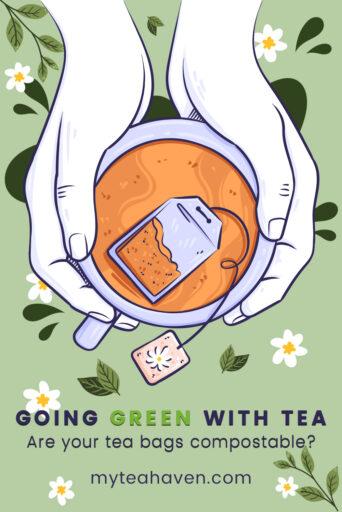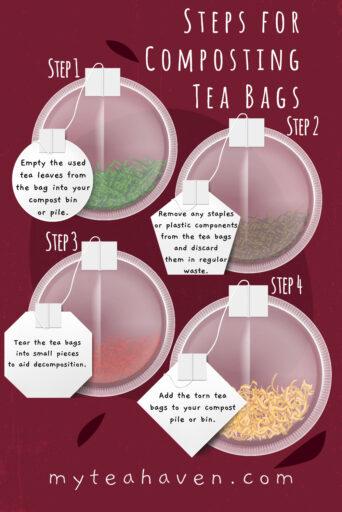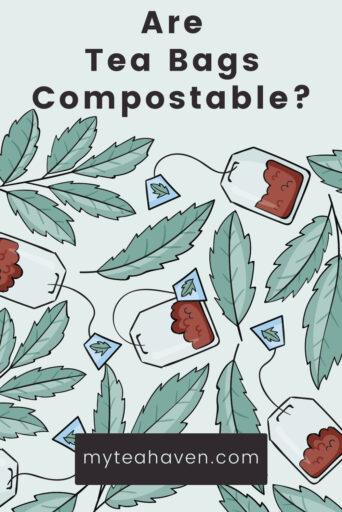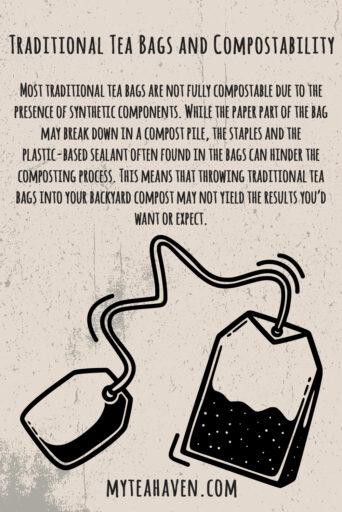Going Green with Tea: Are Your Tea Bags Compostable?
Are Tea Bags Compostable?
Tea has been a beloved beverage for centuries. It has brought many people comfort, relaxation, and a moment of respite in our daily lives. But as all things do in our modern world, producing and consuming tea must have some kind of impact on the environment. One question that I hear frequently is: are tea bags compostable? It’s a good question and probably not one many of us will be able to answer immediately.
Today we will dive headfirst into the world of tea bags. We’ll explore their composition, the environmental implications of traditional tea bags, and the alternatives available to us. Let’s discover the truth about compostability in the realm of tea bags!
We are a participant in the Amazon Services LLC Associates Program, an affiliate advertising program designed to provide a means for us to earn fees by linking to Amazon.com and related sites. This post may contain affiliate links which means we may receive a commission, at no cost to you, for purchases made using our links. Please see my disclosure to learn more. Unless otherwise stated, all prices are in US$.
Introduction
Tea bags have become a vital part of our tea-drinking routine. They offer convenience and ease of use to millions of people around the world. However, not all tea bags are created equal when it comes to compostability.
It’s therefore important to understand the different types of tea bags and their impact on the environment. This is crucial in the journey to making sustainable choices.
What are Tea Bags?

Tea bags are small porous sachets that hold tea leaves or herbal infusions, which allows them to steep in hot water.
They were invented in the early 20th century as a way to simplify the process of brewing tea.
Today, tea bags come in various shapes, sizes, and materials.
Composition of Tea Bags
Traditional tea bags typically consist of a blend of paper fibers, such as bleached or unbleached paper. They also have a small metal staple to keep the bag sealed. However, there is a wide range of materials used in the development of tea bags. This diversity is important to consider when evaluating their compostability.
Traditional Tea Bags and Compostability
Most traditional tea bags are not fully compostable due to the presence of synthetic components. While the paper part of the bag may break down in a compost pile, the staples and the plastic-based sealant often found in the bags can hinder the composting process. This means that throwing traditional tea bags into your backyard compost may not yield the results you’d want or expect.
Environmental Impact of Traditional Tea Bags
The environmental impact of traditional tea bags can be significant.
The non-compostable components mentioned earlier, such as staples and plastic sealants, contribute to the accumulation of waste in landfills.
These components take a considerable amount of time to degrade, adding to the burden on our planet.

Compostable Tea Bags
Does this mean you have to abandon tea bags if you’re hoping to go green? Not at all!
There are compostable options available that offer a more sustainable alternative.
These tea bags are designed to break down naturally in composting environments, leaving behind no harmful residue.
Compostable tea bags are typically made from plant-based materials, such as hemp, cotton, or biodegradable cornstarch.
Materials Used in Compostable Tea Bags
Compostable tea bags are often crafted from renewable and biodegradable materials. Hemp and cotton fibers are popular choices as they are natural and compostable. Another option is tea bags made from cornstarch. Yes, you absolutely read that right… Cornstarch! Tea bags made from cornstarch disintegrates quickly when exposed to the elements.
Benefits of Compostable Tea Bags
Using compostable tea bags is a step towards reducing our ecological footprint. These bags minimize waste and promote sustainable practices. Composting tea bags made from natural materials enriches the soil, fostering a healthy environment for plants.
How to Identify Compostable Tea Bags
Identifying compostable tea bags can be a challenge since not all brands label their products clearly. Look for products that explicitly state they are compostable and made from plant-based materials.
Additionally, certifications like the “OK Compost” or “BPI-certified” logos on the packaging can provide assurance of their compostability.

Composting Tea Bags at Home
Composting tea bags at home is a rewarding way to reduce waste and nourish your garden. Follow these steps to ensure successful composting:
Steps for Composting Tea Bags
- Step 1: Empty the used tea leaves from the bag into your compost bin or pile.
- Step 2: Remove any staples or plastic components from the tea bags and discard them in regular waste.
- Step 3: Tear the tea bags into small pieces to aid decomposition.
- Step 4: Add the torn tea bags to your compost pile or bin. Make sure they are well mixed with other compostable materials.
- Step 5: Maintain a proper balance of carbon-rich (brown) and nitrogen-rich (green) materials in your compost.
Tips for Successful Composting
- Avoid overloading your compost with tea bags. Remember that moderation is key.
- To maintain a healthy compost balance, mix tea bags with other compostable materials such as fruit and vegetable scraps.
- Regularly turn your compost pile to encourage aeration and speed up decomposition.
- Keep your compost pile moist but not waterlogged.


Commercial Composting Facilities and Tea Bags
If you don’t have access to a home composting setup, commercial composting facilities can be an excellent alternative. These facilities are equipped to handle a broader range of materials, including compostable tea bags. Look for facilities in your area that accept tea bags and organic waste for composting.
Other Alternatives to Traditional Tea Bags
If you’re concerned about the compostability of tea bags altogether, there are alternative brewing methods available to you.
Loose-leaf tea is a popular choice among tea enthusiasts. It allows for a more customizable and flavorful experience while minimizing waste.
Using a tea infuser or a reusable tea strainer provides a convenient and eco-friendly way to enjoy your favorite loose-leaf teas.
A Few Final Thoughts

In the quest for a sustainable tea-drinking experience, the compostability of tea bags plays a crucial role.
Traditional tea bags often contain non-compostable components, contributing to waste accumulation in landfills.
Opting for compostable options made from natural materials can significantly reduce our environmental impact.
Composting tea bags at home or utilizing commercial composting facilities ensures they return to the earth in a beneficial way. Alternatively, exploring loose-leaf teas and reusable infusers provides a waste-minimizing alternative. We can all make informed choices that blend our love for tea with a commitment to a greener planet!
Some Questions You Might Have
- Can all tea bags be composted?
No, not all tea bags are compostable. Traditional tea bags often contain non-compostable components like staples and plastic sealants.
- How can I identify compostable tea bags?
Look for products that explicitly state they are compostable and made from plant-based materials. Certifications like “OK Compost” or “BPI-certified” provide further assurance.
- Are compostable tea bags more expensive?
They may have a slightly higher price point than traditional ones due to the use of natural materials. However, the difference in cost is often minimal.
- Can I compost tea bags with other kitchen waste?
Yes, tea bags can be composted along with other kitchen waste such as fruit and vegetable scraps. Just remember to remove any non-compostable components first.
- Are there any alternatives to tea bags?
Yes, loose-leaf tea is a popular alternative. Using a tea infuser or reusable tea strainer allows you to brew tea without generating additional waste.









